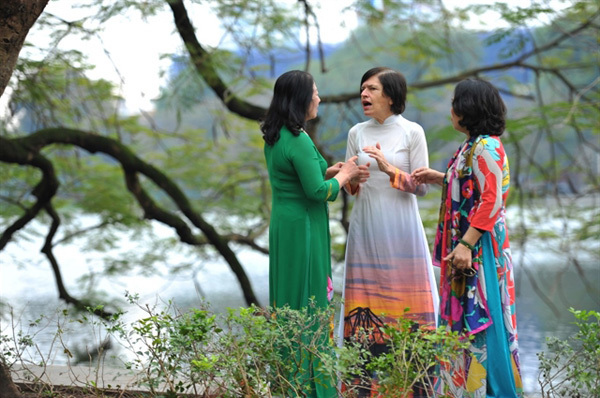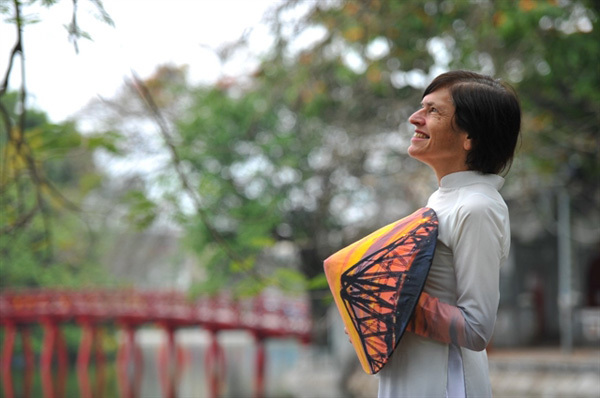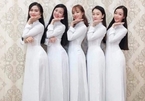 |
| HIGH REGARD: Vice Chairwoman of Friends of Vietnam Heritage, Stella Ciorra (centre), greatly admires Vietnamese culture and heritage. VNS Photo Nguyen A |
How did you come to Vietnam and join Friends of Vietnam Heritage (FVH)?
I first visited Vietnam as a tourist in November 1995. I then returned so many times that it felt like I lived here right from the start. I decided to actually come here to live in 2009.
By 2011, I wanted to experience something different and understand the culture and get below the surface of what I already knew. Through some Vietnamese friends, I found out about FVH and the rest is history. It’s the most amazing cultural and heritage organisation anyone could wish for.
How is FVH run and funded?
It was founded in October 1999 as a cultural and heritage organisation. We are not a for-profit educational society, and our event fees are simply to cover costs. It is run by a committee, which has now grown to about 12 volunteers, and we are so happy that about 70 per cent of the committee are Vietnamese. It meets once a month. We have a monthly programme of events that are led by a committee member. Anyone who wants to sign up for an event does so with the organiser of that event. We keep our events small, as that is the most effective way for people to get the best out of them. Every single event is on a specific topic relating to the history, heritage, culture, and traditions of Vietnam.
About 400-500 people are active members but we have an additional 500 who have left Vietnam but remain on the mailing list so they stay up-to-date and can join an event if or when they are here next. Members include ambassadors and embassy staff and spouses, NGO heads, World Bank staff, and international school teachers.
What is the level of interest among foreigners in Vietnam’s heritage and culture?
So many foreigners adore the local heritage and culture. There are of course a number who are not interested, as it’s not why they are here and they would never join. But FVH members truly respect, admire and honour the heritage and culture of Vietnam. Many are interested in exploring and researching more about Vietnam and take part in cultural activities not just run by FVH but also specialised individual workshops and classes run by Vietnamese. And many foreign women have bought ao dai (the national dress) to wear on special occasions. We feel this is a way to honour Vietnam and show our respect for the country.
How about your work in Vietnam, apart from FVH?
I work with a wonderful boutique hotel group in Hanoi and also as a content writer introducing people to the culture of Hanoi, Hoi An, and Vietnam.
You have appeared on talk-shows and TV programmes dressed in an ao dai. What do you think of the role the ao dai plays in Vietnamese culture?
With any culture and country, I believe the national dress is one of the most defining characteristics and is an important way to show the individuality and culture of a country. Vietnam’s national dress is an important symbol. It is graceful, slender, and beautiful -- just like Vietnam itself.
One must not forget that it is an outfit for both men and women. The modern version of the women’s ao dai is, of course, quite different from the original and traditional style, so one could say it has mirrored the development of Vietnamese culture and society, keeping up with the times but still retaining the essence of tradition.
Nowadays Vietnamese women dress in ao dai for group photos, graduation photos, days out, and important occasions. I would love for it to go further, and for more people to wear ao dai as their daily outfit.
Do you enjoy fashion shows featuring modern ao dai? How would you comment on the creativity and effort of designers in promoting the ao dai?
The outfit is both traditional and modern. Many modern designers use the traditional ao dai style to create a new look while retaining its key elements. And while a modern style may overtake tradition, it’s good to see that the ao dai is still regarded as a very important form of dress. So, promoting it for modern-day tastes is a positive step, because designers are keeping a tradition alive.
As a foreigner, how did you adapt to the local culture and lifestyle?
Personally, I found it extremely easy. I knew back in 1995 that Vietnam would one day be my home. And the reason I came here to live is that I wanted to feel more Vietnamese and live my life here.
One thing I can’t explain and I still don’t understand myself is how some things that are an issue for me in the UK are no problem at all for me in Vietnam. In the UK, I hate noise, I can’t sleep with noise, but in Vietnam the daily noise doesn’t bother me.
In the UK, I like my own space and to live by myself, but since 2015 in Vietnam I’ve shared a house with friends who are a Vietnamese family -- a husband and wife and three young children. Sometimes the husband’s brother and his wife and child and sometimes the mother stay to look after the three children, so I share a real Vietnamese household.
Another way I have adapted is that I have been blessed with some really wonderful Vietnamese friends who have been, and always will be, there for me. I chose to move to Vietnam precisely because of the culture and lifestyle and to become as Vietnamese as possible.
 |
| PERFECT FIT: Stella said she loves wearing ao dai (Vietnam’s traditional dress). VNS Photo Nguyen A |
What do you like most in Vietnam and what do you dislike?
I don’t like the oppressive heat and humidity in the summer, which often now extends into autumn. It’s very uncomfortable. What I love most is the people. I always think it’s people who make a country. And in general, the Vietnamese are amazing, dynamic, hard-working, accepting, forgiving, innovative, and hopeful.
I love the culture and the food, of course, but I think one simple thing I love the most is people and daily interactions. Being able to speak some Vietnamese opens up an amazing world and allows for random conversations with people on the bus or at the bus stop or on the street. Seeing familiar faces and getting to know them and being accepted by them as a casual friend is an amazing feeling.
In particular, I adore small dogs and have built up friendships with people who have wonderful dogs. They invite me into their homes to spend time with their dogs, let me look after them, and send me photos so I can keep in touch with their pets. It makes me feel part of an amazing Vietnamese family thanks to being able to converse in Vietnamese.
Why did you decide to stay in Vietnam for so long?
In 1995, I knew immediately this would be my home because of the people, the national spirit, and the energy. Many Vietnamese are so determined to get where they want to go.
VNS

Traditional dress shines on “Ao Dai Day 2020”
With the aim of further promoting Vietnam’s traditional outfit, the “ao dai”, among international friends and honouring its value while assisting in the compilation of a dossier on recognising Hue ao dai as a national intangible cultural heritage,

More to be done to promote Vietnam’s traditional long dress
Talking about traditional Vietnamese clothing, people often think of the “ao dai” or “long dress” which embodies Vietnam’s rich culture and history.